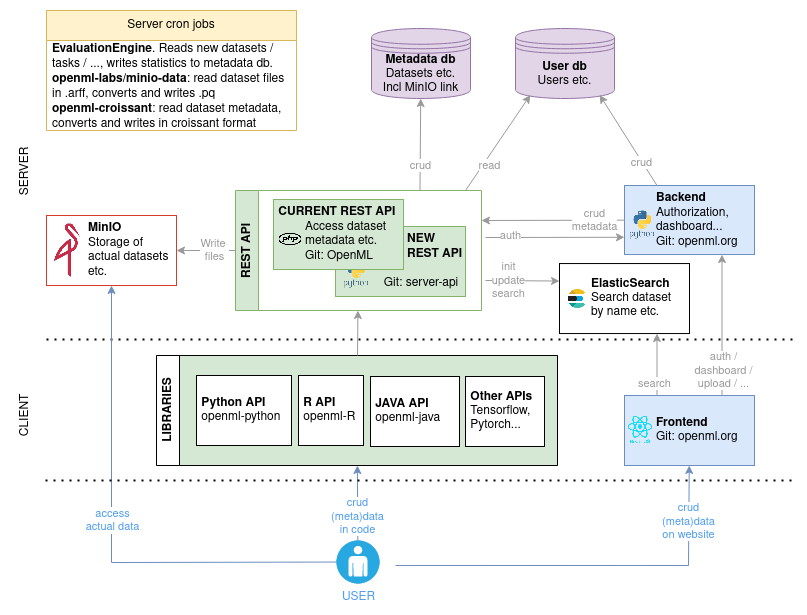Overview of all OpenML components including a docker-compose to run OpenML services locally
- Linux/MacOS with Intell processor (because of our old ES version, this project currently does not support
armarchitectures) - Docker
- Docker Compose version 2.21.0 or higher
When using this project for the first time, run:
chown -R www-data:www-data data/php
# Or, if previous fails, for instance because `www-data` does not exist:
chmod -R 777 data/phpThis is necessary to make sure that you can upload datasets, tasks and runs. Note that the dataset data is meant to be public anyway, so a 777 should not be problematic. This step won't be necessary anymore once the backend stores its files on MinIO.
You run all OpenML services locally using
docker compose --profile all up -dStop it again using
docker compose --profile all downYou can use different profiles:
[no profile]: databases"elasticsearch": databases + nginx + elasticsearch"rest-api": databases + nginx + elasticsearch + REST API"frontend": databases + nginx + elasticsearch + REST API + frontend + email-server"minio": databases + nginx + elasticsearch + REST APP + MinIO + parquet and croissant conversion"evaluation-engine": databases + nginx + elastichsearc + REST API + MinIO + evaluation engine"all": everything
Usage examples:
docker compose --profile all up -d # all services
docker compose up -d # only the database
docker compose --profile frontend up -d # Frontend, rest-api, elasticsearch and databaseUse the same profile for your down command.
See the Github Issue list for the known issues.
Some usefull commands:
docker logs openml-php-rest-api -f # tail the logs of the php rest api
docker exec -it openml-php-rest-api /bin/bash # go into the php rest api container
./scripts/connect_db.sql # access the databaseTip
If you change any port, make sure to change it for all services!
When you spin up the docker-compose, you'll get these endpoints:
- Frontend: localhost:8000
- Database: localhost:3306, filled with test data.
- ElasticSearch: localhost:9200 or localhost:8000/es, filled with test data.
- Rest API: localhost:8080
- Minio: console at localhost:9001, filled with test data.
The credentials for the database can be found in config/database/.env, for minio in config/minio/.env, etc.
The email-server is used for emails from the frontend. For example, if you create a new user, an
email is send to the user. All outgoing emails are rerouted to [email protected]. You can see
the messages in config/email-server/messages. Note that some of the urls in the emails need to
be slightly altered to use them in the test setup: change https to http.
If you want to do local development on containers that are part of the docker-compose, you want those containers to change based on your code. You should have the relevant code somewhere on your system, you only need to tell the docker-compose where to find it. You can do so by setting environment variables.
Create a .env file inside this directory, and set:
PHP_CODE_DIR=/path/to/OpenML # Root of https://github.com/openml/OpenML on your computer
PHP_CODE_VAR_WWW_OPENML=/var/www/openml # Always set this to /var/www/openml. Leave empty if you leave PHP_CODE_DIR emptyMake sure to create openml_OS/config/BASE_CONFIG.php in your local $PHP_CODE_DIR. The correct configuration can be found in config/php.env. Run docker compose with profile rest-api.
ARFF_TO_PQ_CODE_DIR=/path/to/minio-data # Root of https://github.com/openml-labs/minio-data on your computer
ARFF_TO_PQ_APP=/app # Always set this to /app. Leave empty if you leave ARFF_TO_PQ_CODE_DIR emptyCROISSANT_CODE_DIR=/path/to/openml-croissant/python # Python directory of https://github.com/openml/openml-croissant on your computer
CROISSANT_APP=/app # Always set this to /app. Leave empty if you leave CROISSANT_CODE_DIR emptyFRONTEND_CODE_DIR=/path/to/openml.org # Python directory of https://github.com/openml/openml.org on your computer
FRONTEND_APP=/app # Always set this to /app. Leave empty if you leave FRONTEND_CODE_DIR emptyYou can run the openml-python code on your own local server now!
docker run --rm -it -v ./config/python/config:/root/.config/openml/config:ro --network openml-services openml/openml-pythonFor an example of manual tests, you can run:
import openml
from openml.tasks import TaskType
from openml.datasets.functions import create_dataset
import pandas as pd
import numpy as np
df = pd.DataFrame(np.random.randint(0,100,size=(100, 4)), columns=list('ABCD'))
df["class"] = ["test" if np.random.randint(0, 1) == 0 else "test2" for _ in range(100)]
df["class"] = df["class"].astype("category")
dataset = create_dataset(
name="test_dataset",
description="test",
creator="I",
contributor=None,
collection_date="now",
language="en",
attributes="auto",
ignore_attribute=None,
citation="citation",
licence="BSD (from scikit-learn)",
default_target_attribute="class",
data=df,
version_label="test",
original_data_url="https://www4.stat.ncsu.edu/~boos/var.select/diabetes.html",
paper_url="url",
)
dataset.publish()
# Meanwhile you can admire your newly created dataset at http://localhost:8000/search?type=data&id=[dataset.id]
# Wait a minute until dataset is active
my_task = openml.tasks.create_task(
task_type=TaskType.SUPERVISED_CLASSIFICATION,
dataset_id=dataset.id,
target_name="class",
evaluation_measure="predictive_accuracy",
estimation_procedure_id=1,
)
my_task.publish()
# wait a minute, so that the dataset and tasks are both processed by the evaluation engine.
# the evaluation engine runs every minute.
# Meanwhile you can check out the newly created task at localhost:8000/search?type=task&id=[my_task.id]
my_task = openml.tasks.get_task(my_task.task_id)
from sklearn import compose, ensemble, impute, neighbors, preprocessing, pipeline, tree
clf = tree.DecisionTreeClassifier()
run = openml.runs.run_model_on_task(clf, my_task)
run.publish()
# wait a minute, so the the run is processed by the evaluation engine
run = openml.runs.get_run(run.id, ignore_cache=True)
run.evaluations
# Expected: {'average_cost': 0.0, 'f_measure': 1.0, 'kappa': 1.0, 'mean_absolute_error': 0.0, 'mean_prior_absolute_error': 0.0, 'number_of_instances': 100.0, 'precision': 1.0, 'predictive_accuracy': 1.0, 'prior_entropy': 0.0, 'recall': 1.0, 'root_mean_prior_squared_error': 0.0, 'root_mean_squared_error': 0.0, 'total_cost': 0.0}If you want to develop a service that depends on any of the services in this docker-compose, just bring up this docker-compose and point your service to the correct endpoints.
